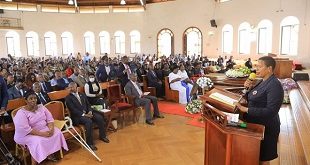
Kampala, Uganda | THE INDEPENDENT | The inability of candidates to read and comprehend questions in national exams is a result of poor teaching methods used in many schools according to some teachers. While releasing the Uganda Advanced Certificate of Education-UACE results last week, Uganda National Examinations Board-UNEB highlighted poor comprehension of questions as one of the challenges which affected the performance of many candidates.
The UNEB executive secretary, Dan Odongo said many candidates couldn’t read and understand questions and as such wrote irrelevant answers. Odongo said both teachers and students are equally to blame for cases of poor comprehension adding that there is need to make changes in teaching and revision methods used.
“I think teachers need to become more practical when teaching learners. That way students understand what is being taught. But also the students need to learn how to do research and understand what is taught. Reading pamphlets cannot help them anymore because the examinations at this level call for them to apply logic and understanding when answering questions,” Odongo said. URN interviewed selected A-Level teachers and head teachers on the observations by the examination body. Some of the teachers intimated that some of the teaching methods that they use could be the problem. They blamed the failure of students to comprehend questions on the huge number of tests they are subjected to which they say stops learners from reading to understand and instead read to pass exams.
Margaret Ngambeki, a Geography teacher at Kalinabiri Senior Secondary School in Ntinda says the habit of administering endless tests to candidates in the guise of preparing them for national examinations is the root of all evil. “Many schools think that preparing candidates for national examinations means giving them many papers. We teachers think that is the best way for learners to pass. Sometimes we give them these examinations without even completing the syllabus. Methods such as these tune students to passing examinations rather than understanding what they have been taught,” Ngambeki said.
According to Ngambeki, in some schools candidates are forced sit more than 12 sets of mock examinations from different parts of the country. The candidates she says spend majority of their second and third term doing tests as opposed to reading for the exams.
Hassan Kajjoba, the principle East high school Ntinda attributes the failure by candidates to comprehend questions on a number of issues including lack of a good learning environment from many private schools where many teachers moonlight to the disadvantage of learners.
He says the habit of moonlighting by teachers denies them time to assess learners sufficiently to test whether there they are ready for national exams. “They (teachers) give notes and run to other schools. When they set exams, they set easy questions. So when learners get to UNEB, the setting of questions leaves them confused,” Kajjoba adds.
In addition to not carrying out quality assessment, some teachers attribute the failure of candidates to answer questions to the use of pamphlets. John Ddumba, the assistant Director of Studies at Emma High School in Kikaaya, says students use pamphlets to read and prepare for examinations instead of using text books.
He says pamphlets highlight answers instead of explaining them, which hinders learner’s ability to understand concepts. Ddumba says students who read pamphlets cannot answer comprehensively, arguing that UNEB sets exams using standards of learners who had read extensively.
Besides the use of pamphlets, Ddumba says that many teachers teach learners in a haphazard manner and use simple texts to ensure that they cram content.
Other teachers that URN spoke to attributed the problem to panic on behalf of the candidates. Catherine Onen, the head teacher Kitante Hill School, says that panic is the cause of the biggest mistakes during national examinations.
“The same people who set UNEB examinations are the same people who write the pamphlets and teach students. Even when students have been exposed to the UNEB way of setting examinations, some of them fail even when they know an answer to a question. At times the candidate might have come across the same question in class but because of panic they read what they think they see and answer,” Onen said.
A total of 103,429 candidates sat UACE examinations last year. Data from UNEB shows that 38,737 passed with three principal passes while 26,986 had two principal passes. 23,327 and 12,818 candidates passed with one principal and subsidiary pass respectively, while 1,433 failed.
******
URN
 The Independent Uganda: You get the Truth we Pay the Price
The Independent Uganda: You get the Truth we Pay the Price


